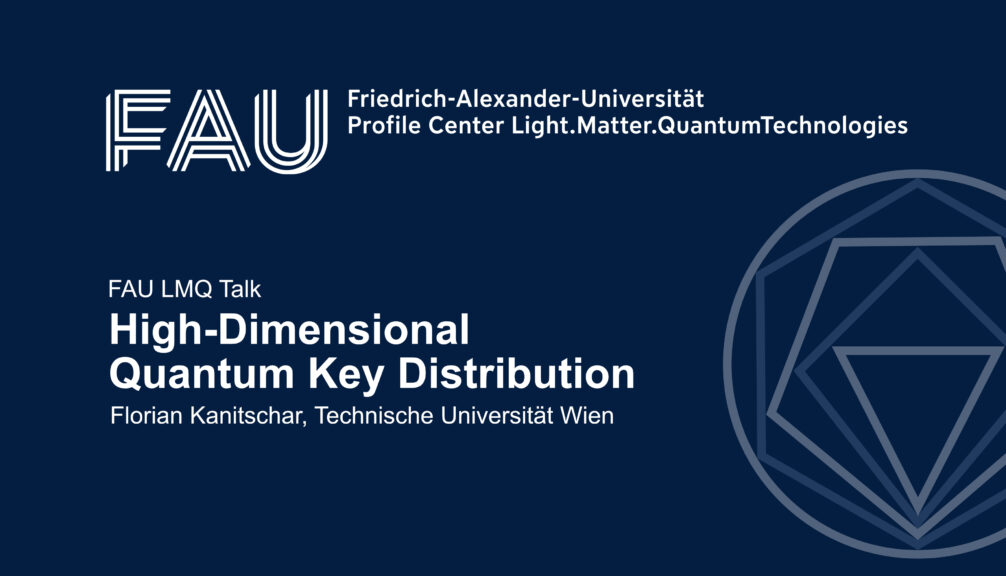We are happy to announce the FAU LMQ Talk on Thursday, 16.01., 10:00 at A.2.500 – Library at the Max-Plack-Institute MPL (Staudtstraße 2, Erlangen), entitled “High-Dimensional Quantum Key Distribution”.
The talk will be given by Florian Kanitschar from the Technische Universität Wien and is open to everyone.
Abstract:
High-dimensional (HD) entanglement offers significant advantages in tasks such as entanglement distribution, paving the way for potential applications in Quantum Key Distribution (QKD). While experimental platforms utilizing high dimensions—such as time-bin, frequency-bin, and orbital angular momentum (OAM)—are well-established, theoretical progress has lagged behind in key areas.
First, rigorous analyses of commonly used HD setups remain sparse. Second, modern convex optimization-based security arguments are constrained by computational limitations, restricting their applicability to low-dimensional systems, while existing analytic proofs often rely on measurements that are experimentally impractical. Third, security analyses for HD-QKD protocols have predominantly been limited to the asymptotic regime and/or lack composability.
In this talk, we address these challenges simultaneously. A novel semi-analytic security proof framework leverages experimentally feasible measurements to derive reliable lower bounds on the secure key rate for general HD-QKD protocols. Initially developed for the asymptotic regime, we extend this approach to the finite-size regime, establishing composable security against coherent attacks.
Our work also emphasizes a practical challenge at the theory-experiment interface: the discrepancy between fixed-length key generation, required by composable security proofs, and the inherently fluctuating nature of real-world quantum channels. Such fluctuations often lead to high abort rates and zero key generation under standard security protocols. To address this, we introduce a variable-length key security proof that dynamically adapts the key length to experimental conditions. We further compare the key rates of fixed- and variable-length approaches using a high-dimensional time-bin setup, demonstrating the advantages of our method for practical implementations of HD-QKD.
Underlying papers:
[1] “Harnessing high-dimensional temporal entanglement using limited interferometric setups”; F. Kanitschar, A. Bergymayr-Mann, M. Pivoluska, and M. Huber; Phys. Rev. Applied 22, 054054 (2024)
[2] “A practical framework for analyzing high-dimensional QKD setups”; F. Kanitschar and M. Huber; arXiv: 2406:08544
[3] “Composable Security of High-Dimensional Quantum Key Distribution Protocols”; F. Kanitschar and M. Huber; manuscript forthcoming

We are happy to announce the FAU LMQ Talk on Thursday, 16.01., 10:00 at A.2.500 – Library at the Max-Plack-Institute MPL (Staudtstraße 2, Erlangen), entitled “High-Dimensional Quantum Key Distribution”.
The talk will be given by Florian Kanitschar from the Technische Universität Wien and is open to everyone.
Abstract:
High-dimensional (HD) entanglement offers significant advantages in tasks such as entanglement distribution, paving the way for potential applications in Quantum Key Distribution (QKD). While experimental platforms utilizing high dimensions—such as time-bin, frequency-bin, and orbital angular momentum (OAM)—are well-established, theoretical progress has lagged behind in key areas.
First, rigorous analyses of commonly used HD setups remain sparse. Second, modern convex optimization-based security arguments are constrained by computational limitations, restricting their applicability to low-dimensional systems, while existing analytic proofs often rely on measurements that are experimentally impractical. Third, security analyses for HD-QKD protocols have predominantly been limited to the asymptotic regime and/or lack composability.
In this talk, we address these challenges simultaneously. A novel semi-analytic security proof framework leverages experimentally feasible measurements to derive reliable lower bounds on the secure key rate for general HD-QKD protocols. Initially developed for the asymptotic regime, we extend this approach to the finite-size regime, establishing composable security against coherent attacks.
Our work also emphasizes a practical challenge at the theory-experiment interface: the discrepancy between fixed-length key generation, required by composable security proofs, and the inherently fluctuating nature of real-world quantum channels. Such fluctuations often lead to high abort rates and zero key generation under standard security protocols. To address this, we introduce a variable-length key security proof that dynamically adapts the key length to experimental conditions. We further compare the key rates of fixed- and variable-length approaches using a high-dimensional time-bin setup, demonstrating the advantages of our method for practical implementations of HD-QKD.
Underlying papers:
[1] “Harnessing high-dimensional temporal entanglement using limited interferometric setups”; F. Kanitschar, A. Bergymayr-Mann, M. Pivoluska, and M. Huber; Phys. Rev. Applied 22, 054054 (2024)
[2] “A practical framework for analyzing high-dimensional QKD setups”; F. Kanitschar and M. Huber; arXiv: 2406:08544
[3] “Composable Security of High-Dimensional Quantum Key Distribution Protocols”; F. Kanitschar and M. Huber; manuscript forthcoming